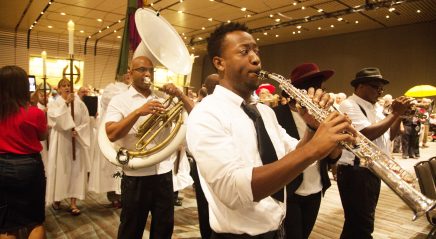Lectionary blog for Dec. 24
Fourth Sunday of Advent
2 Samuel 7:1-11; Luke 1:46-55 or Psalm 89:1-4, 19-26;
Romans 16:25-27; Luke 1:26-38
A few years ago, I saw a little story in Reader’s Digest. I clipped it out and filed it under the title: “Perplexed.” The writer was a clerk in the admitting office of a hospital. One very busy day, there was a parade of people coming to her desk. She perfunctorily handed them all clipboards with pens and admission forms. There was a crowd filling out forms, being interviewed or being escorted to their rooms. One very timid woman tentatively entered the clerk’s office. She handed over her completed admission forms, her insurance card and her driver’s license. Without looking up, the clerk took the material and began entering the information into the computer. Suddenly she asked, “What is your reason for coming to the hospital?” There was such a long pause without an answer that she looked up. The woman was looking at her watch. Finally, she said, “Well, I came to visit my sister, but this has taken so long, I’ll have to come back tomorrow.” Like I said, I filed it under “Perplexed.”
Our text says that “Mary was much perplexed.” I imagine she was. This was a completely out of the ordinary, startling, bedazzling, confusing, frightening situation. Under the circumstances, perplexed might be a bit of an understatement. First of all, there’s an angel in her bedroom. I’m not sure what an angel looks like, but, even if an angel just looks like an ordinary human being, waking up to a strange yet ordinary looking someone in your bedroom would be frightening enough.
Our text says that “Mary was much perplexed.” I imagine she was. This was a completely out of the ordinary, startling, bedazzling, confusing, frightening situation.
But there’s more, the strange being in her bedroom told her she was going to have a baby. Though Mary is quite young and inexperienced in these matters, she is neither stupid nor ignorant. She knows where babies come from, and she knows she hasn’t done that so … Huh? What?
Then the angel said that her theoretical baby was going to be the long-awaited messiah, the savior of Israel—and what had been weird became crazy. No wonder Mary was “perplexed.”
It is likely that she was also petrified, confused and scared out of her wits.
It is doubtful that any of us have ever been confronted with an angel in the bedroom, but all of us have found ourselves in perplexing circumstances. We have all been faced with living in a world of uncertain futures, times when our life seems to be out of our hands and out of control. As a Christian people, we stand in the middle of such uncertainties with an added layer of perplexity—we are called of God to be a different sort of folk, a peculiar people the Bible calls us, a royal priesthood, a holy nation. In this Advent season, we are reminded that our primary calling is to bring Christ into the midst of our perplexing world.
As we ponder this calling, we can learn from Mary about how to respond to this. We can learn from her humility—the healthy recognition of one’s unworthiness. Mary did not immediately assume she deserved the role she was being handed; she did not go about bragging that she had been named No.1 in a poll of eligible maidens; she did not “humble brag” about the great honor she had received. Instead, she bowed her head, called herself “a servant of the Lord” and went quietly about the business of trying to explain things to her fiancé.
God has chosen us, the church, to bring Christ into the world. Just as Mary carried the Christ child in her womb so that God could be born into the midst of a needy world, we carry Christ in us, so that God can be born again, and again and again—in selfless acts of love and sacrifice as we encounter and serve those we meet.
We can also learn from her faith—a quiet, confident trust in God’s goodness even in the midst of mysterious and inexplicable goings-on. Mary had no reason to believe that her nocturnal vision was anything other than an odd dream. It was, frankly, no more believable then than it is now, no more reasonable to her than to us. Her outward circumstances did not show that she was carrying within her the inheritor of the “throne of David,” the son of God, the Prince of Peace, the king of kings. She was just a young girl from a small village, given in marriage to an ordinary working man.
Yet, she held onto the promise; she never let go of the vision; she kept the faith. She held onto that promise, that vision, for almost 35 years. She held onto it through the confusion of his preaching and teaching, his rejection and suffering, his crucifixion and death. And on Easter, she saw the promise fulfilled, the vision realized, the dream become reality.
We too are called this day to hold onto the dream, to believe and remember the promise, to keep the faith, to see God’s vision through to the end, to carry Christ into the world with us, no matter how perplexed, or confused, or hesitant we might feel.
Amen and amen.








